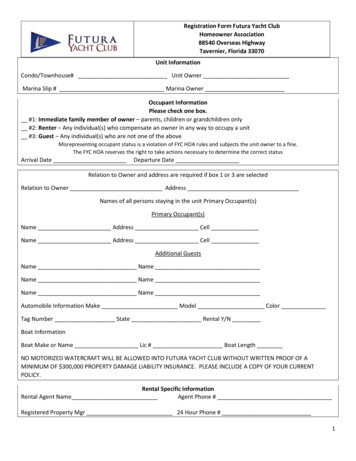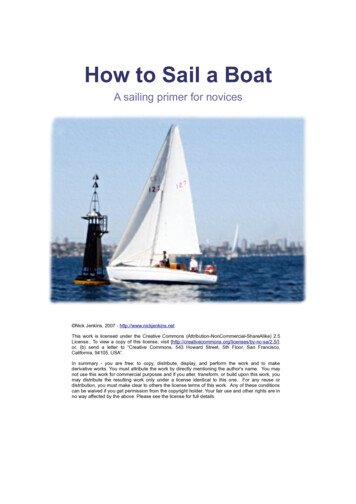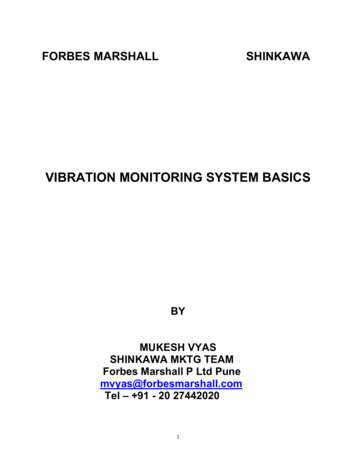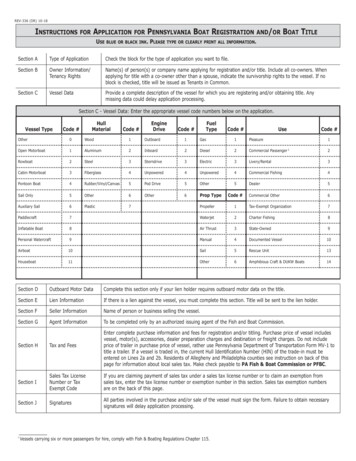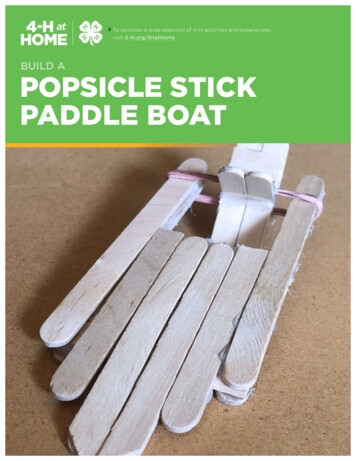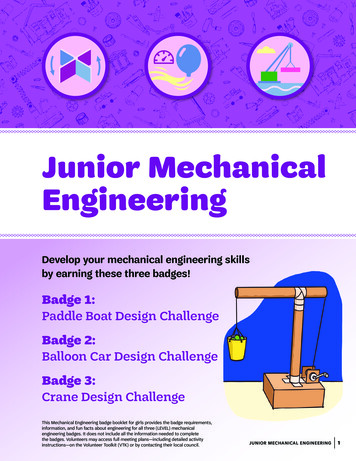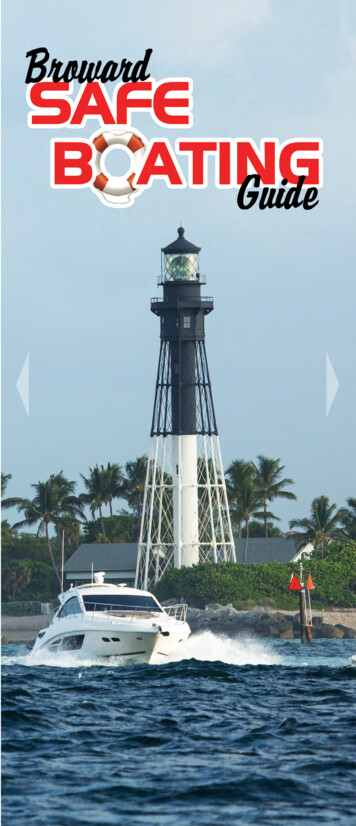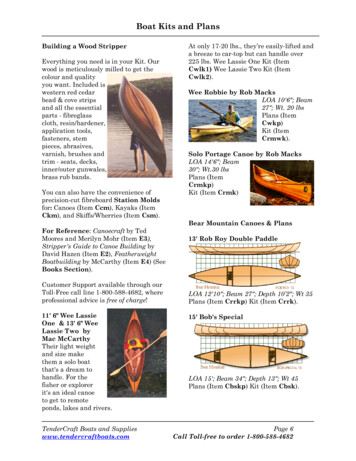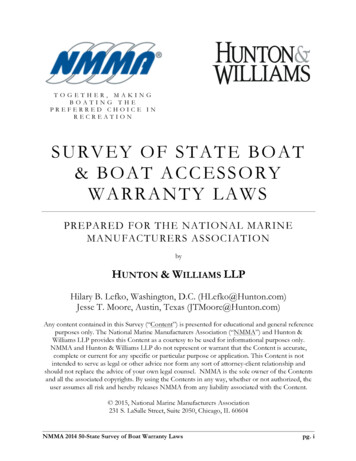
Transcription
TOGETHER, MAKINGBOATING THEPREFERRED CHOICE INRECREATIONSURVEY OF STATE BOAT& BOAT ACCESSORYWARRANTY LAWSPREPARED FOR THE NATIONAL MARINEMANUFACTURERS ASSOCIATIONbyHUNTON & WILLIAMS LLPHilary B. Lefko, Washington, D.C. (HLefko@Hunton.com)Jesse T. Moore, Austin, Texas (JTMoore@Hunton.com)Any content contained in this Survey (“Content”) is presented for educational and general referencepurposes only. The National Marine Manufacturers Association (“NMMA”) and Hunton &Williams LLP provides this Content as a courtesy to be used for informational purposes only.NMMA and Hunton & Williams LLP do not represent or warrant that the Content is accurate,complete or current for any specific or particular purpose or application. This Content is notintended to serve as legal or other advice nor form any sort of attorney-client relationship andshould not replace the advice of your own legal counsel. NMMA is the sole owner of the Contentsand all the associated copyrights. By using the Contents in any way, whether or not authorized, theuser assumes all risk and hereby releases NMMA from any liability associated with the Content. 2015, National Marine Manufacturers Association231 S. LaSalle Street, Suite 2050, Chicago, IL 60604NMMA 2014 50-State Survey of Boat Warranty Lawspg. i
TABLE OF CONTENTS1.Chart Summarizing State Boat and Boat Accessory Warranty Laws . 12.Overview of Laws & Regulation for Boat and Boat Accessory Warranties. 22.1.General Contract Law . 22.2.The Uniform Commercial Code . 22.3.Federal Law . 32.4.General Consumer Protection Regulation . 32.5.Manufacturer-Dealer Regulation . 42.6.Insurance Regulation . 43.Discussion of State Laws on Consumer Boat and Boat Accessory Warranties . 53.1.Alabama . 53.2.Alaska . 63.3.Arizona . 73.4.Arkansas . 73.5.California. 83.6.Colorado . 103.7.Connecticut . 123.8.Delaware . 123.9.Florida . 123.10.Georgia . 133.11.Hawaii . 133.12.Idaho . 143.13.Illinois . 153.14.Indiana . 153.15.Iowa . 163.16.Kansas . 163.17.Kentucky . 173.18.Louisiana . 173.19.Maine . 193.20.Maryland . 223.21.Massachusetts . 223.22.Michigan . 233.23.Minnesota . 24NMMA 2014 50-State Survey of Boat Warranty Lawspg. ii
3.24.Mississippi . 253.25.Missouri . 263.26.Montana . 273.27.Nebraska . 283.28.Nevada . 293.29.New Hampshire . 303.30.New Jersey . 313.31.New Mexico . 313.32.New York . 323.33.North Carolina . 343.34.North Dakota . 343.35.Ohio . 343.36.Oklahoma . 353.37.Oregon . 353.38.Pennsylvania . 363.39.Rhode Island . 373.40.South Carolina . 373.41.South Dakota . 383.42.Tennessee . 383.43.Texas . 393.44.Utah . 403.45.Vermont . 423.46.Virginia . 433.47.Washington . 453.48.West Virginia . 463.49.Wisconsin . 463.50.Wyoming . 47NMMA 2014 50-State Survey of Boat Warranty Lawspg. iii
1. Chart Summarizing State Boat and Boat Accessory Warranty esNoNoNoYesMinimum LaborRate forManufacturerDealer WarrantyWorkReimbursementNoYesNoNoYesMinimum PieceCost forManufacturerDealer URIMONTANANEBRASKANEVADANEWHAMPSHIRENEW JERSEYNEW MEXICONEW SYLVANIARHODE ISLANDSOUTHCAROLINASOUTH NoNoNoNoNoNoNoNoNoNoNoNoNoNoNoNoYesNoNoYesYes sYesNoNoYesYesYesYesNoNoManufacturerDealer BuyBackRequirementsNoNoNoNoNoNoNoYes esNoNoNoNoNoNoYesNoNoYesNoYesNoYesNoNMMA 2014 50-State Survey of Boat Warranty Lawspg. 1
ONYesYesNoNoWEST nufacturerDealer BuyBackRequirementsYesYes (personalwatercraft)NoNoYes (personalwatercraft)YesYesNoMinimum LaborRate forManufacturerDealer WarrantyWorkReimbursementYesYes (personalwatercraft)NoYesYes (personalwatercraft)YesNoNoMinimum PieceCost forManufacturerDealer WarrantyWorkReimbursementYesYes (personalwatercraft)NoYesYes (personalwatercraft)YesNoNo2. Overview of Laws & Regulation for Boat and Boat Accessory WarrantiesThis survey focuses on state-specific laws and regulations applicable to boatand boat accessory warranties. Warranties are principally governed by contract law,including customary common law and statutes such as the Uniform CommercialCode. Federal regulations may apply, including the Moss-Magnuson Act and FederalTrade Commission regulations issued under that Act. Additional state consumerprotection laws affect warranties, as do certain state regulations of insurers andmanufacturer-dealer relationships.2.1.General Contract LawWhen evaluating a warranty (or any other contract), the warranty itself is thefirst place to start. Express warranties can be oral or written. Generally speaking,agreements are enforced according to their terms. Evaluating a warranty requiresunderstanding applicable fundamentals such contract formation, contractinterpretation, third-party rights, contract breach, and post-breach remedies.For example, questions of whether a warrantor must replace a product, repair aproduct, or refund a product, and how much the refund should be, turns first onwhether a remedy is selected in the contract or damages are limited or fixed. Almostall other major issues relating to boat and boat accessory warranties—such as durationof a warranty, calculations of and limits upon repair costs, and obligations torepurchase—are primarily determined by the terms of the warranty. Manufacturers ofboats or boat part accessories should have written customer agreements defining andlimiting their warranty obligations.NMMA 2014 50-State Survey of Boat Warranty Lawspg. 2
2.2.The Uniform Commercial CodeEvery state except Louisiana has now enacted, in some form or fashion, Article2 of the Uniform Commercial Code (the “UCC”). The UCC applies to transactionsin “goods” such as boats and other watercraft and their accessories.1 Under the UCC,as at common law, parties generally have latitude in drafting the warranty and thewarranty will be enforced according to its terms in most instances. The UCCprovides default rules that will apply if there is no controlling agreement.Express warranties may be created through affirmations of fact, promises,descriptions of goods, and samples or models as long as those actions orcommunications are part of the basis of the bargain made with the buyer.2 Sellers ofgoods may make express warranties with or without providing a written agreement orusing formal terms such as “warranty” or “guaranty.”3 A complete and exclusivewritten agreement will typically protect sellers against attempts to enforce priorinconsistent express oral warranties.4In addition, by default sellers provide buyers with implied warranties of title,merchantability, and fitness plus other implied warranties that may arise from courseof dealing or usage of trade.5 The warranties of merchantability and fitness are notclearly defined. Determining whether such implied warranties cover a malfunction ina boat or boat part requires an evaluation of many issues, including the nature allegeddefect and overall industry standards and reasonable customer expectations.As under the common law, the UCC permits both express and impliedwarranties to be limited by words, conduct, or agreement.6 The UCC requires specificand clear notice to restrict implied warranties.7 Further, plenty of states imposefurther limits on disclaimers of implied warranties especially with regard to consumergoods.8 Given the vague nature of implied warranties, boat and boat accessoryU.C.C. § 2-102.Id. § 2-313.3 Id.4 Id. § 2-202.5 Id. §§ 2-312, 2-314, & 2-315.6 Id. § 2-316(1).7 Id. § 2-316(2)-(3).8 See, e.g., MD. CODE, COM. LAW §2-316.1(2)-(3) (“Any oral or written language used by a seller ofconsumer goods and services, which attempts to exclude or modify any implied warranties of merchantabilityand fitness for a particular purpose or to exclude or modify the consumer’s remedies for breach of thosewarranties, is unenforceable. However, the seller may recover from the manufacturer any damages resultingfrom breach of the implied warranty of merchantability or fitness for a particular purpose. Any oral or writtenlanguage used by a manufacturer of consumer goods, which attempts to limit or modify a consumer's12NMMA 2014 50-State Survey of Boat Warranty Lawspg. 2
manufacturers should have written contracts limiting their implied warrantyobligations.Along with limiting implied warranties, manufacturers should also limitdamages for breach of warranty. As at common law, the UCC generally permits anagreement to limit or fix damages within a reasonable range and to specify remedies.9A properly drafted warranty will limit damages, including consequential and incidentaldamages, and preserve a warrantor’s discretion to repair or replace defective goodsafter receiving requisite notice. Certain states have abridged the right to limit damagesby agreement, especially with regards to consumer products or claims for personalinjury. Choice-of-law provisions in warranties can, in some instances, determinewhich state’s laws will apply to these issues.2.3.Federal LawThe Magnuson-Moss Warranty–Federal Trade Commission Improvement Actof 1975 (the “MMWA”) and the regulations of the Federal Trade Commission (the“FTC”) adopted pursuant to the provisions of that Act are essential components ofUnited State warranty law. 10 The MMWA itself is not terribly complicated, but theregulations issued under the MMWA by the FTC are somewhat lengthy and also mustbe understood and followed by entities issuing warranties for consumer goods,including boats and boat accessories.11Broadly speaking, the MMWA requires clear, adequate, and consistentdisclosure and explanation of the terms of express written warranties. The MMWAonly imposes minimal regulations upon the terms of those warranties. Consumerwarranties should be drafted and evaluated in light of the MMWA.2.4.General Consumer Protection RegulationAlong with the UCC, most states have passed some sort of Deceptive TradePractices Act or other unfair trade practices act (“DTPA”). DTPAs typically forbidthe use of misrepresentations or other deceptive practices in commerce.12remedies for breach of the manufacturer’s express warranties, is unenforceable, unless the manufacturerprovides reasonable and expeditious means of performing the warranty obligations.”).9 U.C.C. § 2-719(1).10 See 15 U.S.C. §§ 2301 et seq.11 Forcellati v. Hyland’s, Inc., 876 F.Supp.2d 1155, 1164 (C.D. Cal. 2012) (quoting Kemp v. Pfizer, Inc., 835F.Supp. 1015, 1024 (E.D. Mich. 1993) (quoting Magnuson–Moss Warranty Act: Implementation andEnforcement Policy, 40 Fed.Reg. 25,721, 25,722 (1975))).12 U.D.T.P.A. §§ 2(5) & 2(7).NMMA 2014 50-State Survey of Boat Warranty Lawspg. 3
Misrepresentations, material omissions, and other misconduct regarding warranties orservice contracts can violate DTPAs.Many states have enacted other consumer protection laws that more specificallyaddress warranties in general or even boat and boat part warranties in particular.These laws must also be considered when drafting warranties or evaluating warrantyclaims.2.5.Manufacturer-Dealer RegulationSome states regulate relations between boat dealers and boat/boat accessorymanufacturers under laws for distributors, franchises, and other arrangements. Insome instances these regulations directly affect warranty obligations. While theregulations that do touch on warranties tend to focus more on the manufacturerretailer relationship, in some instances these regulations affect rights and obligationsamong consumers and manufacturers or other entities in the supply chain that do notdirectly conduct business with consumers. Further, many of these laws do setminimums for manufacturer reimbursements to dealers for warranty work. Thispaper notes where state regulations on manufacturers and dealers, distributors, andfranchisors affect legal obligations and rights relating to boat warranties.2.6.Insurance RegulationSome states have enacted insurance regulations affecting boat and boataccessory warranties. Insurance can be broadly defined as an “agreement by whichone party agrees to do something of value for another party upon the occurrence ofsome specified contingency.”13 A warranty that promises to repair or replace a goodupon the occurrence of a failure or breakdown can fit this definition. Further, manyof the public policy considerations that drive insurance regulation—ensuring fairness,ensuring that the insurer has the wherewithal to fulfill its promises—could also justifywarranty regulation.Plenty of states have accordingly begun regulating warranties, at least insofar asthose warranties are “extended warranties” or “service contracts” made forconsideration separate and in addition to the purchase of the goods. Florida evengoes further and regulates warrantors regardless of whether they provide traditionalwarranties or service contracts. Warranties for “vehicle protection products” are alsocommonly regulated, and as shown below most of these statutes could arguably applyto boats as “vehicles.”13See, e.g., BLACK’S LAW DICTIONARY at 355(2d pocket ed. 2001).NMMA 2014 50-State Survey of Boat Warranty Lawspg. 4
3. Discussion of State Laws on Consumer Boat and Boat AccessoryWarranties3.1.AlabamaConsumer Protection: Alabama’s DTPA specifically includes “[i]ntentionallymisrepresenting that a warranty or guarantee confers or involves certain rights orremedies” as an unlawful trade practice.14Manufacturer-Dealer Regulation: In 2009 Alabama enacted regulations fordealers and suppliers (i.e., manufacturers) of “heavy equipment,” which includes “selfpropelled machinery for maritime usage.”15 This law ostensibly could apply toboats. Its requirements mostly focus on relationships between manufacturers anddealers, however. The requirement that suppliers indemnify dealers from certaincustomer claims may be worth noting.16 Dealer agreements must be reasonable.17Vehicle Protection Products: In 2006 Alabama enacted laws that apply to“vehicle protection products” but do not define the crucial term “vehicle.” “Vehicleprotection products” are described as follows:A vehicle protection device, system, or service that is all of the following:a. Installed on or applied to a vehicle.b. Is designed to prevent loss or damage to a vehicle from aspecific cause.c. Includes a written warranty.For purposes of this chapter, the term vehicle protection product shallinclude, without limitation, alarm systems, body part marking products,steering locks, window etch products, pedal and ignition locks, fuel andignition kill switches, and electronic, radio, and satellite trackingdevices.18Boats could come equipped with devices that are similar to these named vehicleprotection products. Where these devices are backed by a written warranty,warrantors must provide certain disclosures and information in that warranty.19Customer discretion to cancel such warranties in a limited fashion is required,ALA. CODE § 8-19-5(21).Id. § 8-21B-3.16 Id. § 8-21B-11.17 Id. § 8-21B-10.18 Id. § 8-33-2(6).19 Id. § 8-33-7.1415NMMA 2014 50-State Survey of Boat Warranty Lawspg. 5
warrantors must retain certain records, and warrantors are prohibited from callingthemselves “insurers” and the like.20Extended Warranties: Like many states, Alabama regulates “service contracts”or extended warranties. A “service contract” is a contract “for a separately statedconsideration” for the repair, replacement, or maintenance of property.21 “Servicecontracts” are not “warranties,” however. A true “warranty” is not made for“consideration stated separately from the price of the property or services sold,” noris it “negotiated separate from the sale of the product” and must be “incidental to thesale of the product[.]”22 Sellers of service contracts must, among other things, registerwith the state, provide certain disclosures to customers, and maintain certain financialassurances of performance.23 As with warranties for vehicle protection products, theterms of service products are regulated, limited customer cancellation is required,providers must retain certain records, and providers are prohibited from callingthemselves “insurers” and the like.243.2.AlaskaConsumer Protection: Alaska’s DTPA specifically forbids “representing thatan agreement confers or involves rights, remedies, or obligations which it does notconfer or involve, or which are prohibited by law[.]”25 In addition, the Alaska DTPArequires disclosure and separate itemization when a repair bill includes charges forwork and a charge for a guaranty or warranty.26Manufacturer-Dealer Regulation: Alaska does directly regulate warranties for“marine products,” which includes “a new watercraft, boat, or gasoline motordesigned for recreational or commercial use on water” but not “a watercraft designedor adapted to be powered only by an occupant’s energy[.]”27 Manufacturers mustprovide standard warranties to a purchaser from an authorized dealer.28 Dealers mustfully and accurately disclose warranties and deliver operation and maintenancemanuals to buyers.29 The law governs claims and reimbursements between dealers andId. §§ 8-33-7, 8-33-8, & 8-33-9.Id. § -8-32-2(13).22 Id. § 8-32-2(15).23 Id. § 8-32-3.24 Id. §§ 8-32-3 to 8-32-8.25 ALASKA STAT. § 45.50471(b) (14).26 Id. § 45.50.471(b) (17) (making it a DTPA violation to “bas[e] a charge for repair in whole or inpart on a guaranty or warranty rather than on the actual value of the actual repairs made or work to beperformed on the item without stating separately the charges for the work and the charge for the guaranty orwarranty, if any”).27 Id. § 45.27.390(7).28 Id. § 45.27.100.29 Id. § 45.27.120.2021NMMA 2014 50-State Survey of Boat Warranty Lawspg. 6
manufacturers and restrictions by manufacturers for dealer repairs.30 There areminimum rates for labor reimbursement and parts must be reimbursed at the currentmanufacturer’s full suggested retail price.31If non-conforming products cannot be repaired, they must be replaced or thefull purchase price minus the reasonable value of the purchaser’s use must beprovided by the manufacturer.32 Claims must be presented by the purchaser inwriting with certain information and within a limited period of time.33 Certain actionsby the purchaser, such as abuse or alteration, will excuse the manufacturer fromcompliance with these requirements.34Manufacturers do have repurchase obligations upon cancellation or nonrenewalof a dealership agreement.353.3.ArizonaConsumer Protection: Arizona’s DTPA does not specifically addresswarranties. Nevertheless, warranties must be accurately described and presented tocustomers without deception or concealment.363.4.ArkansasConsumer Protection: While the Arkansas DTPA does not specifically addresswarranties, it generally prohibits making false representations about services, takingadvantage of customers’ inability to understand agreements, and using deception orconcealing material facts in connection with the sale of services.37 “Services” caninclude warranties as something that is purchased that lacks physical characteristics.38Extended Warranties: Arkansas specifically regulates “service contracts” butexcludes “warranties” from this scheme insofar as warranties are (1) made withoutcharge, (2) not sold separately, (3) incidental to the sale of the product, and (4) for therepair or replacement of property and related services.39 Manufacturers who do enterregulated service contracts/extended warranties must register with the state, establishcertain financial assurances of performance, provide certain disclosures to consumers,Id. §§ 45.27.130-180.Id. § 45.27.150.32 Id. § 45.27.19033 Id. § 45.27.200.34 Id. § 45.27.210.35 Id. §45.37.050.36 ARIZ. REV. STAT. § 44-1522(A).37 ARK. CODE §§ 4-88-107 & 4-88-108.38 Id. § 4-88-102(7).39 Id. § 4-114-102(c)(14).3031NMMA 2014 50-State Survey of Boat Warranty Lawspg. 7
retain certain records, permit the cancellation of such agreements in certaincircumstances, and refrain from requiring the purchase of service contracts.403.5.CaliforniaConsumer Protection: Although it has not enacted a general DTPA, Californiatypically leads the nation in enacting consumer protection laws. Chief among theseprotections is the Song-Beverly Consumer Warranty Act, which applies to warrantiesfor “consumer goods.” 41 Boats will be considered “consumer goods” if they arepurchased or used for personal, household, or family purposes.42Warranties for such boats must therefore contain “simple and readilyunderstood language” and “clearly identify the party making the express warranties”along with complying with the other MMWA requirements discussed above.43 Asunder the MMWA, there are limits on registration cards and registration cannot berequired from a customer.44 Invoices and work orders for warranties must remindcustomers of their rights and the required extension of warranty coverage in instancesof defect.45Manufacturers who maintain service and repair facilities in the State ofCalifornia must disclose the address and telephone numbers of those facilities tocustomers (or provide a 1-800-number of out-of-state facilities) and must assistretailer sellers in maintaining lists of authorized facilities.46 Manufacturers whoprovide express warranties must either (1) maintain “service and repair facilitiesreasonably close to all areas where its consumer goods are sold,” (2) contract withindependent service and repair facilities that are so situated, or (3) pay transportationcosts.47 “[S]ufficient service literature and replacement parts to effect repairs duringthe express warranty period” must be provided to such facilities.48Independent servicemen must be compensated for “the actual and reasonablecosts of the service and repair, including any cost for parts and any reasonable cost oftransporting the goods or parts, plus a reasonable profit” unless provided by contractwith the manufacturer.49 However, such a below-cost contract may be illegal inId. §§ 4-114-104 thru 4-114-109.CAL. CIV. CODE § 1793.1(a).42 Id. § 1791(a).43 Id. § 1793.1(a).44 Id.45 Id.46 Id. § 1793.1(e).47 Id. § 1793.2(a)(1).48 Id. § 1793.2(a)(3).49 Id. § 1793.6.4041NMMA 2014 50-State Survey of Boat Warranty Lawspg. 8
California—a manufacturer may not enter an agreement for “for the performance ofwarranty service and repair for products manufactured by such person, below thecost to such service or repair agency of performing the warranty service or repair”under California’s unfair trade practices act.50When boats are non-conforming with applicable warranties, they should berepaired within a reasonable time period, which is defined as 30 days unless
NMMA 2014 50-State Survey of Boat Warranty Laws pg. 1 1. Chart Summarizing State Boat and Boat Accessory Warranty Laws Applicable Deceptive Practices Laws Extended Warranty /Service Contract Regulation Potentially Applicable Vehicle Protection Product Regulation Minimum Statutory Manufacturer Warranty Length Manufacturer-Dealer Buy-Back

